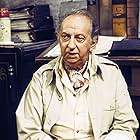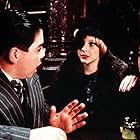Füge eine Handlung in deiner Sprache hinzuYemana assists a bigoted Army officer when a bomber threatens a recruiting facility. Fish takes a turn at mugging detail.Yemana assists a bigoted Army officer when a bomber threatens a recruiting facility. Fish takes a turn at mugging detail.Yemana assists a bigoted Army officer when a bomber threatens a recruiting facility. Fish takes a turn at mugging detail.
Empfohlene Bewertungen
"Group Home" was the one episode among the last five concluding this third season that Abe Vigoda's Fish made a rare appearance, and includes one of his most indelible images on mugging detail, dressed as a woman, wondering whether to use the men's room or the women's. Popping in for a brief spell is Florence Stanley's Bernice (fifth of six), taking Denise Miller's Jilly (third and last appearance) and John Cassisi's Victor (second and last) to see the dentist. Phil Leeds (second of seven) plays Lou Hector, the unfortunate fellow who sees Fish walking by his park bench, making him an offer he couldn't resist (Fish: "why didn't you leave me alone, I told you to!" Lou: "I thought you were flirting!" Fish: "what did you offer me 20 dollars for?" Lou: "that's all I had!"). Harris has invested $35 for a genealogy report on his family background, having viewed the recent broadcast of ROOTS, and is stunned to find his ancestors living in Scotland; either that or his grandfather owned a liquor store in Cleveland. In his second appearance is George Murdock, better known as Lt. Ben Scanlon (11 episodes), here for the only other time in the part of Master Sgt. J. R. Reville, hoping to identify a bomber (Don Calfa, first of seven) threatening a recruiting facility (his revolting description of the suspect's cough is enough to make Harris cringe). A strict military disciplinarian, Reville takes an instant dislike to the Japanese Yemana, until learning they both served on OUR side during WW2 ("so it didn't make any difference to YOU who won!"). James Cromwell (first of four) plays the police artist who sketches an accurate depiction of the bomber, still upset over the army conducting germ warfare experiments in the New York subways, which they discontinued by 1970 (Fish and Barney decide to take a cab).
Handlung
WUSSTEST DU SCHON:
- WissenswertesSgt. Nick Yemana served in the U.S. army during World War II. He was in the 442nd infantry division "Nisei", which consisted almost entirely of Japanese-American soldiers. (The word "Nisei" refers to American-born children of Japanese immigrants and Nisei itself is Japanese for Second.)
- PatzerWhen Master Sergeant Reville is first talking to Yemana, the neck end of the epaulet (the piece of material that runs from his right sleeve to his collar) on his right shoulder keeps changing. Sometimes it's tucked under the collar (the way it should be) and sometime the pointed end is out, on top of the collar. It changes several times during this initial conversation, indicating they did several takes of this scene.
- Zitate
Det. Ron Harris: [about his genealogy report] They didn't go back far enough, they stopped at my great, great grandfather, Ezekiel Harris.
Capt. Barney Miller: Oh? Was he a slave?
Det. Ron Harris: [disappointed] No, he owned a liquor store in Cleveland.
- VerbindungenFeatured in Barney Miller: Jack Soo, a Retrospective (1979)
Top-Auswahl
Melde dich zum Bewerten an und greife auf die Watchlist für personalisierte Empfehlungen zu.
Details
Zu dieser Seite beitragen
Bearbeitung vorschlagen oder fehlenden Inhalt hinzufügen
















